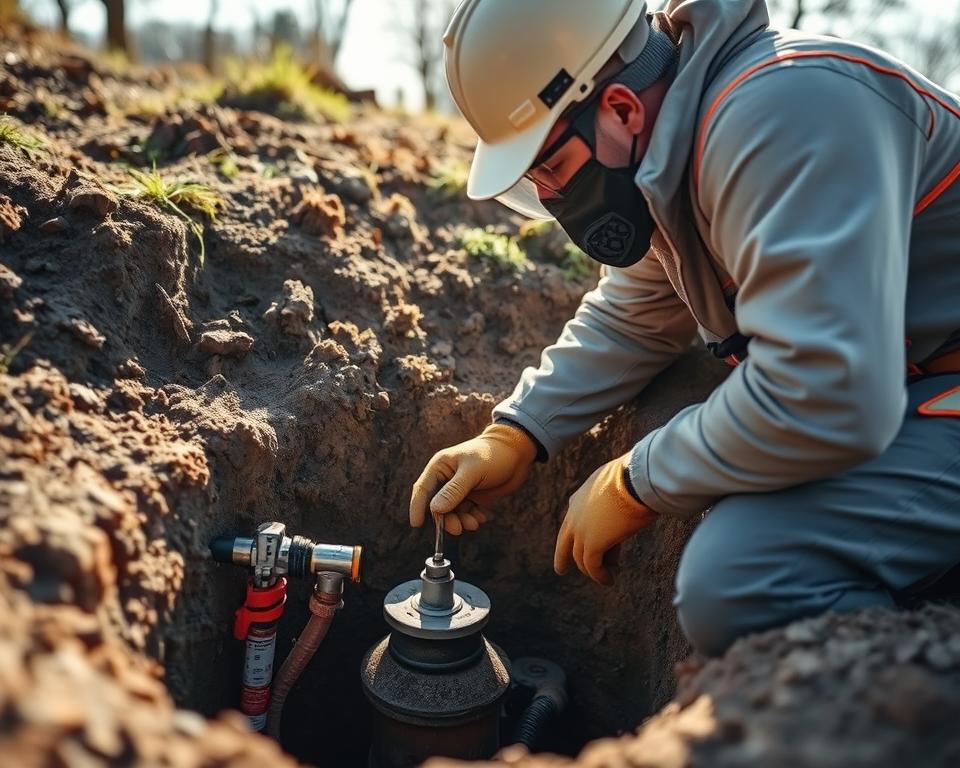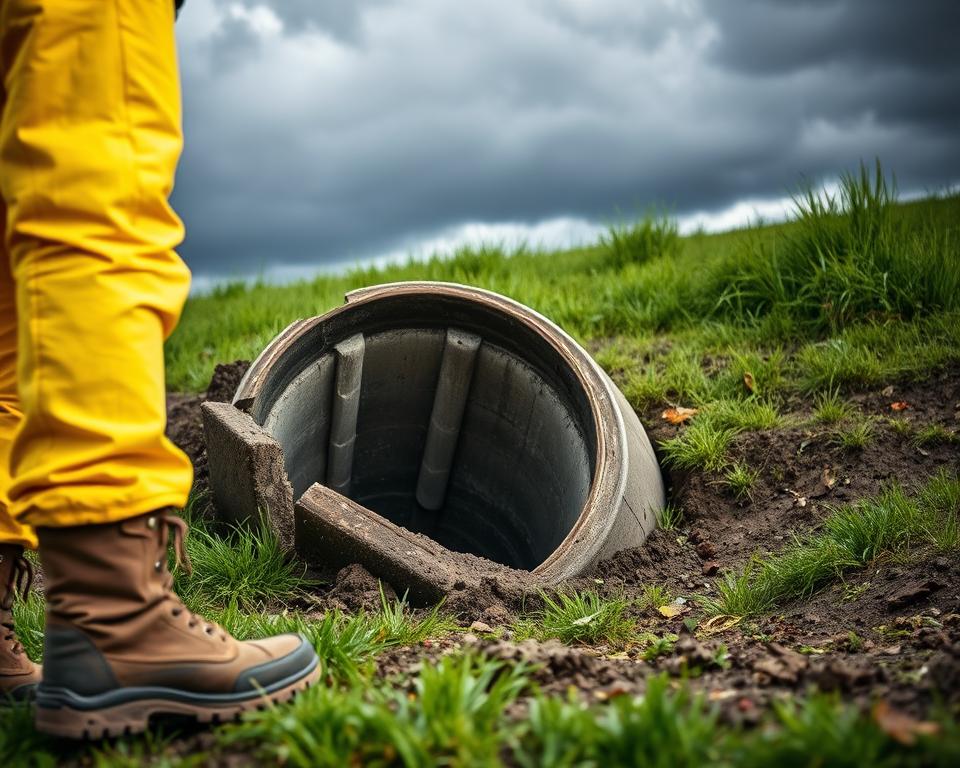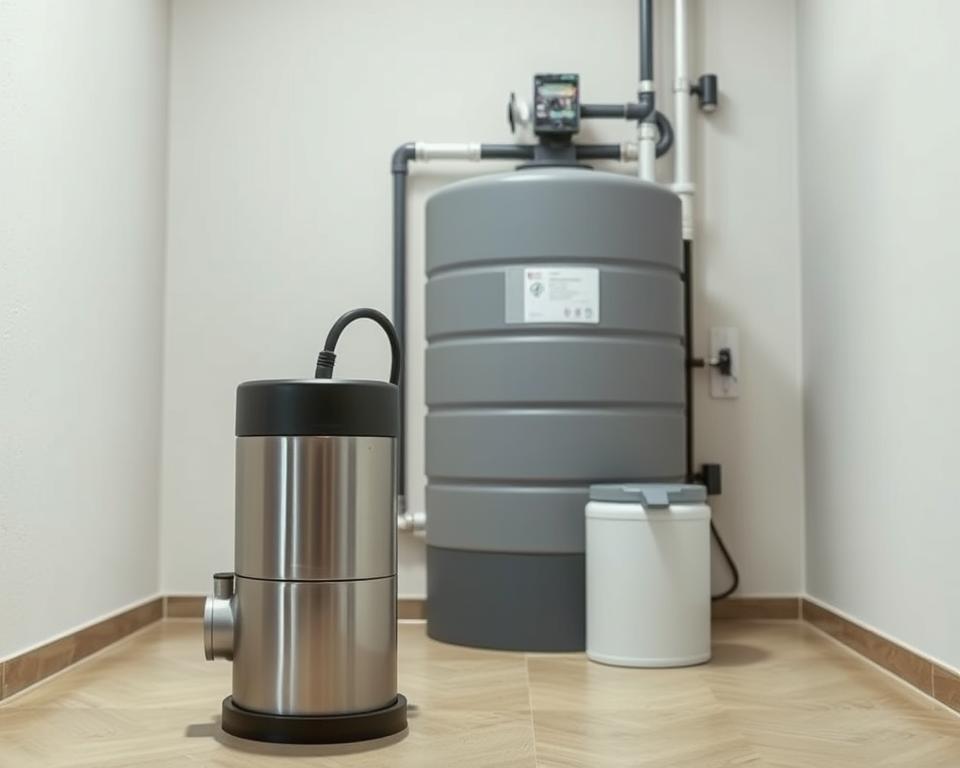Pumping Your Septic System
Have you ever wondered how often you should set up septic system pumping so you can dodge hefty breakdowns? With more than 20 percent of U.S. households relying on septic systems, grasping their maintenance is crucial. Knowing precisely when to book a septic tank service is key to its lifespan. Moreover, there are economical septic pumping solutions that ensure top-notch functionality while staying on budget. Below, we outline crucial upkeep tips useful for every homeowner.
Vital Takeaways
- Routine septic system pumping is vital for efficient operation.
- Spotting the indicators that show the necessity for service can prevent major issues.
- Choosing professional septic system pumpers secures top-quality maintenance.
- Affordable septic pumping choices are available for homeowners.
- Regular inspections promote optimal system performance.
Understanding Your Septic System
A septic system performs a key role in processing household wastewater, comprising several important components that function in unison. The main drain line carries wastewater from your home to the septic tank, where the process begins. In the tank, an underground chamber, solids sink at the bottom, and bacteria break down these solids, treating the waste efficiently.
The treated liquid outflow next moves from the septic tank to the distribution box, where it is distributed evenly across the drain field or leach field. Here, the soil continues the filtration, continuing to purify the wastewater. Comprehending the functions of these septic system parts is vital. It allows homeowners to monitor and upkeep their systems properly.
Knowing how your septic system operates helps you implement preemptive maintenance measures. It’s beneficial to have periodic appointments with licensed service providers of septic systems – septic tank pumping companies near me. They provide crucial insights for peak functioning of your system. These experts assist in scheduling the necessary pump-outs and checks. This proactive approach can significantly lengthen your septic system’s lifespan.
Why Septic System Maintenance Matters
Maintaining your septic tank on a routine basis is pivotal for homeowners who wish their system to remain reliable. A well-cared-for system provides peace of mind and secures your property’s value. Without adequate care, you’re risking system breakdowns and health dangers.
Choosing a top-notch septic pumping service is essential. They deliver timely inspections and pump-outs, removing sludge and scum buildup. If maintenance is overlooked, emergency pumping may be required, which is pricey.
Following a steady maintenance plan is wise. It includes professional evaluations and regular pumping. This proactive measure heads off urgent issues, ensuring a more secure living environment for everyone.

Warning Signs for Septic Systems
Keeping an eye on septic system issues can avoid budget-breaking repairs and major damage. Typical signs indicate when your system demands a check. These include:
- Sluggish drains throughout the house
- Pooling water in the yard above the drain field
- Foul odors near the septic tank or leach field
- Unusually lush grass growth in certain areas of your yard
These symptoms could indicate problems that might result in your system failing. Swift intervention is vital. Contacting septic pumping professionals for an inspection assists. Timely action prevents initial issues from turning into major ones. Moreover, routine upkeep ensures your system operates well and has a longer life.
Best Practices for Septic System Pumping
Proper pumping of your septic tank is essential to sidestep expensive clogs and backups. It’s necessary to establish the appropriate schedule for maintenance. Homeowners should usually schedule pumping every 2 to 5 years, based on the tank’s size and household wastewater levels. Intensive use of garbage disposals may demand more frequent pumping.
Employing experienced pumpers means your tank gets a complete clean and check-up. During pumping, professionals look for any issues, such as faulty baffles. Finding these problems promptly heads off bigger expenses and inconveniences later. Regular pumping schedules and expert help ensure your septic system’s efficient operation.
Regular Inspections Keep Your Septic System Running
Periodic inspections are crucial for your septic system’s performance. Septic system inspections highlight early issues before they grow. Experts advise inspections every three to five years, influenced by system size and household usage. This sidesteps costly fixes.
Maintaining maintenance records is crucial for tracking your system’s condition. These records provide insights into previous inspections, repairs, and suitable intervals to schedule septic tank cleaning services. With this information, planning for future upkeep becomes more straightforward, keeping septic systems in prime shape.
Regular inspections and detailed record-keeping not only improve system efficiency but also extend its life. This method protects the environment and the investment in a safe, operational home.
| Inspection Type | Recommendation Frequency | Benefits |
|---|---|---|
| Visual Inspection | Annually | Identify surface issues |
| Professional Inspection | Every 3–5 years | Assess functionality and detect problems |
| Septic Tank Pumping | Every 3–6 years | Prevent overflow and system failure |
Water-Saving Habits for a Healthier Septic System
Smart water use is essential for keeping your septic system sound. It not only supports the environment but also improves the performance of your home’s plumbing. By embracing easy, yet effective, conservation methods, homeowners can decrease wastewater.
Spread out your laundry activities over the week instead of running back-to-back loads. This helps the septic system to handle water better and avoids tank overflow. Opting for low-flow fixtures in your kitchens and bathrooms leads to considerable water savings, retaining the water pressure up while lowering the flow rate, thus trimming the amount of wastewater produced each day.
Quickly fixing leaks is another way to help your septic system. Even a small leak can cause a large waste of water, overburdening the septic system. Through frequent inspections and repairs, you materially improve the system’s efficiency.
Prioritizing water conservation isn’t just good for your septic system; it’s also a step towards sustainable living. Making such practices into your daily routine serves both your household and the planet.
Proper Handling of Household Waste
Homeowners carry a crucial role in maintaining their septic system’s health by disposing of household waste appropriately. It’s essential to avoid throwing away non-biodegradable items like wipes, plastics, and other harmful products in the system. These items can cause clogs, resulting in costly repairs and a decrease in efficiency.
Composting food scraps and organic materials is a beneficial alternative to throwing them in the trash. This practice greatly lowers the amount of solid waste entering the septic tank. Prioritizing biodegradable waste disposal preserves the ecological balance needed for effective waste management.
It’s essential to watch what goes down the drains. Non-decomposable items can requiredemand more frequent septic tank pumping. By understanding and observing correct waste disposal methods, you can ensure a more efficient and long-lasting septic system.
Safe Cleaning Products for Your Septic System
The health of your septic system is heavily influenced by your choice of cleaning products. Using septic-safe cleaning products is essential. These products protect the balance of beneficial bacteria that break down waste. Many standard cleaners have harmful chemicals that endanger this balance, resulting in pricey repairs or system failure.
Homeowners should look into natural alternatives that are both powerful and environmentally friendly. Common household items like baking soda, vinegar, and lemon juice are great choices. These natural cleaners are not only good at cleaning but also encourage your septic system’s health.
Avoiding products that contain antibacterial agents and chlorine bleach is vital. Such substances destroy the helpful good bacteria, compromising your system’s functionality. By adopting sustainable products, you secure both the efficiency and longevity of your septic system.
Why Bacteria Matter in Septic Systems
Bacteria carry out a vital role in keeping your septic system functional. They break down solids naturally and enhance nutrient processing. A lack of healthy bacteria can lead to system failure, creating costly repairs.
Homeowners can bolster their system by adding organic additives. These products raise beneficial bacteria, making waste decomposition more effective. It’s important to opt for organic additives that are beneficial, not harmful, to the septic environment.
A robust bacterial community is crucial to a septic system’s longevity and efficiency. It stops solid buildup and lessens the need for frequent pumping. Focusing on bacterial health creates waste management more effective and eco-friendly.
Final Thoughts
Septic system care is vital for the longevity and functionality of your home’s wastewater system. Adhering to essential maintenance tips avoids costly repairs. Understanding routine pumping and inspections is paramount. This secures your septic system keeps in peak condition.
Learning about your septic system’s operation and smart approaches in water and waste management is crucial. Engaging professionals like All in Sanitation delivers expertise. This supports your septic system’s long-term health and provides confidence.
Putting effort into proper septic maintenance today brings future benefits. It shields your home and enhances your family’s quality of life. Emphasizing septic system care provides certainty with a well-maintained system.


